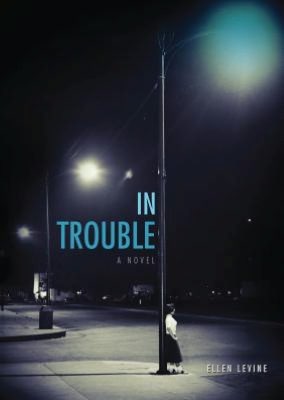Levine, Ellen. In Trouble. Minneapolis: Carolrhoda, 2011.
Audience: High School, 14-17
Genre: Problem Fiction Novel
Topics of Focus: Abortion, Rape, 1950s, Pre-Roe v. Wade era, Choices, Family Support Systems
Red Flags: Abortion, Rape, Teen Pregnancy
Ellen Levine does not shy away from a difficult topic. In her recent novel, In Trouble, she takes on one of the toughest for our current culture to debate—abortion and freedom of reproductive choice.
Set in the Cold War, communist-fearing 1950s, the narrator Jamie must face an array of choices and challenges regarding her sexual and reproductive self. Providing the main psychological support for her friend, Elaine, who is facing an unplanned teen pregnancy with her boyfriend, Jamie hides her own pregnancy, a result of an unreported rape perpetrated a friend of an older cousin. Once Elaine’s family discovers her situation, they force her into a home for expectant young mothers with a plan to give up the child for adoption. Jamie is left to deal with her own pregnancy by herself along with the trauma of rape and its emotional aftermath. She hesitates to include her family who have significant challenges of their own, especially her father who has recently been released from prison after refusing to name names at the McCarthy communist hearings.
Set in the Cold War, communist-fearing 1950s, the narrator Jamie must face an array of choices and challenges regarding her sexual and reproductive self. Providing the main psychological support for her friend, Elaine, who is facing an unplanned teen pregnancy with her boyfriend, Jamie hides her own pregnancy, a result of an unreported rape perpetrated a friend of an older cousin. Once Elaine’s family discovers her situation, they force her into a home for expectant young mothers with a plan to give up the child for adoption. Jamie is left to deal with her own pregnancy by herself along with the trauma of rape and its emotional aftermath. She hesitates to include her family who have significant challenges of their own, especially her father who has recently been released from prison after refusing to name names at the McCarthy communist hearings.
There are no easy answers in this book. No happy solutions. In Trouble reflects a time period when women held very few avenues of power and control over their own bodies. The only positive outcome was in the conversations, the telling of secrets, and trusting in family support. Levine’s novel reminds the reader how slippery the slope may be to returning once again to the anxieties and brutal choices faced by Jamie in a no-choice world.
While a bit preachy in its tone, In Trouble could be successfully used by educators in a family issues or health class. It is not the type of book a teen would pick up as an elective read. However, a librarian or teacher could place the story in the right hands, especially of young, politically-minded women who would like to read more about the dark ages of reproductive health. Levine’s approachable text is also useful as an example of how to combine a variety of voices and effective flashback memories to expose secrets, fears, and unwelcomed thoughts without destroying the cadence of the story.
Annotation by Denise Aulik

No comments:
Post a Comment